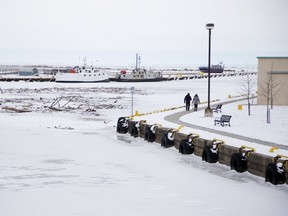What an Ohio city's bold move to protect Lake Erie tells us
An Ohio city that shares Lake Erie with Southwestern Ontario has thrown down the gauntlet, declaring the lake has rights just like a human being.

Article content
An Ohio city that shares Lake Erie with Southwestern Ontario has thrown down the gauntlet, declaring the lake has rights just like a human being.
Sure, Toledo’s bold step endorsing a bill of rights for the lake is already generating pushback, including questions whether it can stand up in court and be enforced.
And, yes, while the move in a referendum was backed by 61 per cent of voters in the city of 280,000, the turnout was a meagre nine per cent.
But if a lake once so filthy it was practically given up for dead, can be embraced by one city as something that deserves better, what’s that say to Southwestern Ontario – its own hands far from clean in Erie’s woes – about upping the ante to help protect the lake that runs hundreds of kilometres along the region’s underbelly?
Erie, by most accounts, is in far better shape now than in the grim old days of the 1970s, when industrial waste made it a poster child for pollution and a frequent butt of jokes.
Yet, as Southwestern Ontarians have seen in recent years, problems still abound, especially in the lake’s western zone:
- Toxic algae blobs, including one that infamously grew nearly as large as Prince Edward Island, fueled by the chemical fertilizers and animal waste washed into Erie from the vast farm belts that surround it, including in Southwestern Ontario.
- Dead zones in the lake, so deprived of oxygen that nothing lives.
- Raw or only partially treated human sewage, including from London, swept into waterways that drain into Erie when heavy rains overwhelm treatment plants.
- Outside invaders, often arriving as hitch-hikers in ship ballast, from the zebra mussel to take-no-prisoners foreign fish that menace a rich commercial and sport fishery.
The line in the sand drawn by Toledo, where toxic algae forced a shutdown of its Erie water system for days in 2014, should send a clear message north, some environmentalist say: Do better by the lake that 11 million people – Londoners and many Southwestern Ontarians among them – rely on for their drinking water.
“What we really need to do is look at the (lake) as a whole, as an ecosystem that has inherent rights, that transcends the political parties of the day,” said Ken Bell, an environmentalist in Chatham-Kent, which borders the lake.
Erie, said Bell, “is more than a resource – it’s like a living being; it deserves respect.”
Recognizing the lake has legal rights, as Toledo voters did, means lawsuits could also be filed on behalf of the lake and its drainage area.
The backlash was swift. An Ohio farm family launched a lawsuit the next day, challenging the bill’s constitutionality.
“Basically, people don’t want to change,” said Bell, noting environmentalist have faced the same public sentiment for years.
The ballot question emerged from a city whose drinking water supply was interrupted for three days in the summer of 2014, when a massive blue-green algae bloom shut down its Erie intake system. Regulators feared the toxin-producing bacteria could harm people.
Toledo voters remembered that “water crisis” when they went to the polls, said Crystal Jankowski, of Toledans for Safe Water and organizer of the Lake Erie Bill of Rights.
And “they voted knowing that they can’t swim, that they can’t eat the fish from our part of the lake.”

Erie’s algae has been a problem since the mid-1990s, so persistent environmental agencies forecast each spring what to expect in the summer heat when the algae takes off.
“It’s not an ‘if’ but ‘when and how bad’, which is a sad place to be in with our lake.” said Kelsey Scarfone of Environmental Defence, a Canadian environmental group.
She said research shows area residents care about the Great Lakes, but don’t fully understand their biggest threats. Even fewer take environmental action.
She said she hopes Toledo’s move will inspire more Canadians to “reconnect with the water” and let governments know “how deeply they care and want to see something done.”

WHAT OTHERS SAY
“It may not be a silver bullet, but already the bill of rights “has put the national spotlight again on Lake Erie . . . We have a problem that needs to be fixed.”
– Sandy Bihn of Lake Erie Waterkeeper, an Ohio-based environmental group
“Toledo’s move shouldn’t distract from how much Canada and the U.S. have done to bring Erie back in recent decades. That includes a vow to cut by 40 per cent the amount of phosphorus, found in human and animal waste and fertilizers, from entering the lake and fueling algae. “I do think people are starting to pay a lot more attention to the situation.”
– Sarah Rang, Great Lakes and St. Lawrence Cities Initiative
LAKE ERIE: DID YOU KNOW?
- World’s 11th largest lake
- Home to the world’s largest freshwater fishery
- Shallowest, smallest by volume and warmest of the Great Lakes






Postmedia is committed to maintaining a lively but civil forum for discussion. Please keep comments relevant and respectful. Comments may take up to an hour to appear on the site. You will receive an email if there is a reply to your comment, an update to a thread you follow or if a user you follow comments. Visit our Community Guidelines for more information.